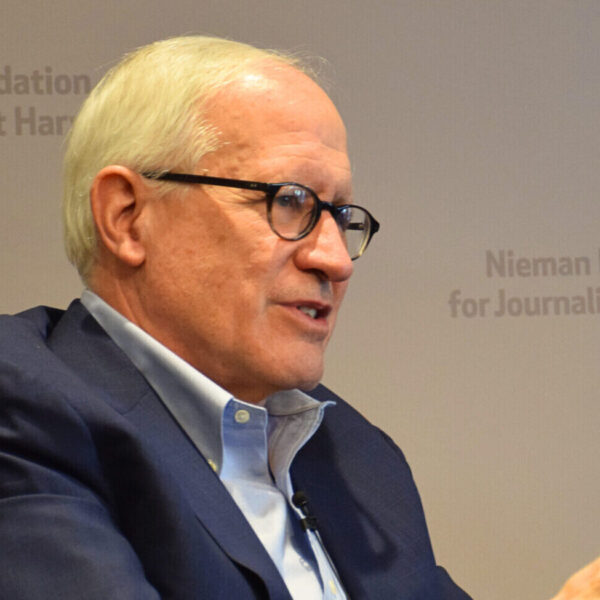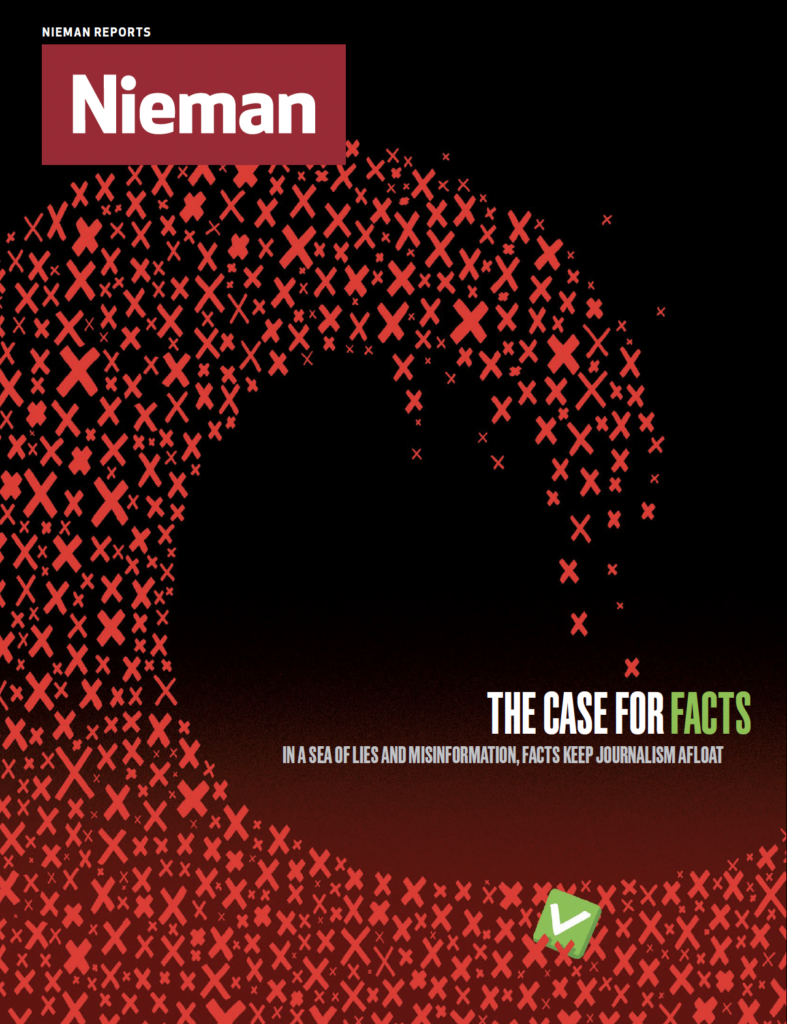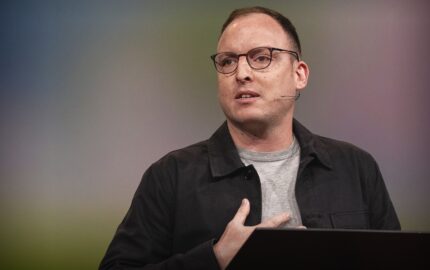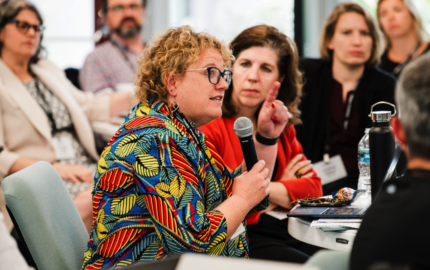President Donald Trump has long been a vocal critic of the press, labeling journalists as the "enemy of the people" and vowing retribution against those he considers adversaries.
David McCraw, senior vice president and deputy general counsel for The New York Times, and a lecturer at Harvard Law School, spoke to the current Nieman class about the challenges facing journalists as Trump begins his second term. These include tactics the administration has signaled it may use to restrict press access, including prosecuting leakers and those that speak to reporters, as well as exploring new laws to use against the media.
McCraw is the author of the 2019 book, “Truth in Our Times: Inside the Fight for Press Freedom in the Age of Alternative Facts,” which includes analysis on the legal challenges the Times faced during Trump’s first term.
McCraw has worked on key cases involving the Freedom of Information Act, libel suits, press access, and other issues, and offered insights on how to push back against legal threats against the press. Edited excerpts:
On declining public support for the media
I think the thing that's concerning to me … is the breakdown of public support for the idea of freedom of press. There's been a lot of discussion [recently] of the Trump administration and freedom of speech. But the concern is, to me, simply the public buy-in on freedom of the press … If you see the undermining of the idea of how important freedom of press is, I think it's very difficult for journalists to do what they need to do, and for those of us in courts to do what we need to do to protect that.
I did learn about freedom of press in Monticello, Illinois, which had about 3,200 people when I grew up there … They voted reliably Republican every time, but they did believe in freedom of the press, and that's because one of the things you learned growing up in Illinois as a kid is: every governor ended up in jail! My parents and their friends and neighbors believed that maybe we would stop these politicians from stealing if we had a press that was vibrant and able to stop it. And I fear that sense, that the press is there on behalf of all of us just to hold government accountable, is an idea that we just need to give support to — I do think it has been frayed.
Right after I finished my book, there was a poll done, and they found that 26% of the people believed that the president should be allowed to shut down a news outlet that, quote, misbehaved, and whatever the Founding Fathers thought about the First Amendment, whatever they thought about press freedom, that was not it.
On the risks the press may face under Trump
I think probably the most likely change [we’ll see] in terms of how the administration deals with the press will be that we're going to see more attempts to find out who is leaking within government, and that as a result of that, we will see more subpoenas served on the reporters.
We'll see more attempts by the government to get access to the records. I think that's pretty much a foregone conclusion that didn't happen during the Biden administration, but fairly certain will happen during the Trump administration. I think there probably will be an uptick in libel cases. I am less concerned about that because the law has remained stable, [we] still have really good defenses.
Those of you who are from other countries and practicing journalism in much tougher places than the United States will find this interesting: The New York Times gets sued on average two to four times a year. That's it.
So, we don't see a lot of libel suits, but I do think there will be an uptick. In the last Trump administration, we went from our two to four average, which has been the case for years — in the last year of the presidency of Donald Trump, there were 10. There obviously was the sense that suing for libel has value to people who may oppose what they think the Times is about.
I think there's some concern about using non-media law to go after news organizations in part, just because they're in the United States system and there are so many guardrails to protect freedom of the press … So what we're seeing is this strange dive into consumer statutes. You may have seen President Trump sued the Des Moines Register and their main outside pollster, and it wasn't for libel, it was for consumer fraud. They printed something that wasn’t untrue, and it didn't harm anybody’s reputation, but [the legal argument was] it was a fraud on the good citizens of Iowa by inducing them to buy subscriptions and so forth and so on … That should be a preposterous claim … but you do see [those kinds of cases].
On possible legal challenges to media access
Yes, access becomes a choke point for journalism … During the pandemic, I was asked to be the keynote speaker at the ABA (American Bar Association) book awards. At that time, everybody [was] talking about freedom of speech online and the platforms and so forth. And I said this: Don’t lose sight of the fact of how much power the government has to control the flow of information to the press … Look at what information gets to the public and it starts with access.
If you can't get those documents, if you have a second-rate Public Records Act, if you can't get into a press conference because somebody doesn’t like what you wrote, it becomes a huge problem. I think we'll see that, as bad as the Freedom of Information Act is in this country, that it will be used to restrict the flow, not to free [the] flow of information. And it’s important that people like me push back against that.
I think you'll see the same things that you saw in the White House in the first go-around, [for example], when President Trump threw Jim Acosta out of the press briefing room.
I would say what makes me hopeful is that despite the rough run the press has had, a lot of conservatives really believe in transparency. A lot of conservatives still, like my parents were, [believe] that you need to know what these guys are up to. And so, [for instance], Florida has one of the best Freedom of Information laws in the country.
There's this incredible case, it's making its way to the Supreme Court and out of Texas, where an [independent] reporter was arrested for asking for information from the police. She asks the police for some information about a suicide. She gets it, and then she's indicted criminally under a statute which makes it illegal to obtain government information for a profit-making purpose if you don't have the right to that information. The charges were ultimately dropped, and she sued the police on the theory that who would have thought you could be arrested for asking questions?
What makes me hopeful is that the first time that case was heard, Judge James Ho, who is probably [one of] the most conservative members of the judiciary, says, “I would assume that everybody in America knows they’re allowed to ask questions in the public interest.”
On legal resources for small or nonprofit newsrooms
If you look back on the cases that I cover in my [Harvard Law School] class, the cases in which freedom of the press was established — roughly between 1964 and 1989, that's really the body of cases — if you look at those news organizations that brought them whose names are on there: Press Enterprise. Press Enterprise was a fairly small newspaper in Riverside, California. Florida Star, one of the biggest cases decided by the Supreme Court. Florida Star had a circulation of 11,000. Richmond newspapers, the single most important access case where the press won the right under the First Amendment to be present in a criminal trial — Richmond newspapers. Richmond newspapers are not a big news operation. They were bringing these cases, and you just don't see that anymore.
And for all [these] reasons it's concerning, because those cases, everybody's case, can help shape the law and if it's not well defended, then we can get law we don't really want.
The things that I think are going on that give me a little bit of hope is that there is a big move to have more nonprofit, pro bono legal help to news organizations. So there's an organization now called Lawyers for Reporters, which is exactly that. They will work with nonprofit news organizations throughout the country on a variety of legal concerns. They do that for free. That's important.
Several foundations have funded clinics at law schools all across the country, many of them are focused on access to information. So you see all around the country again, beginning really with Yale, but now at various law schools around the country, where there are clinics that are fairly well-funded that are assisting in bringing these access cases, or in some cases, responding to threats on freedom of the press and similar issues.
So, those kinds of things are going to be helpful. But it really does cost money, and for most of these organizations, you really want them to step up.
I think it's one of the reasons why we felt, over the last 15 years, the need to really press Freedom of Information cases. We have 20 pending at any time against the federal government. And we see our role as that prod to the government, that if somebody's not doing that, secrecy becomes the order of the day.
I’m very proud that we filed our first FOIA case — first Freedom of Information case against the Trump administration — on 12:01 on the 21st [of January]. We did not do it on Inauguration Day, on the [Martin Luther King Jr.] holiday, but one minute after the holiday ended, we filed.




